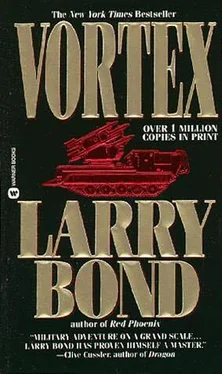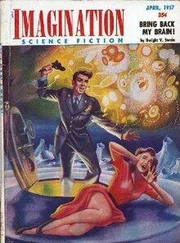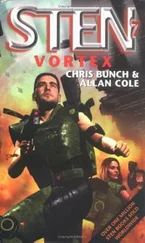He hadn’t enjoyed that at all. Shooting or arresting fellow South Africans was unpleasant duty. Unfortunately, the presence of brown shirt Brandwag “special units” left him little freedom for maneuver. As it was, he’d nearly lost his command after refusing to execute several white prisoners found guilty at a “summary court” held by the area’s senior AWB representative.
That had been bad enough. But now he faced total disaster.
When the emergency orders from the Eastern Transvaal Military Command arrived, his three infantry companies were spread out over a hundred-kilometer square, dispersed in patrols and detachments. Just gathering the company-sized force he had here had taken most of the morning and afternoon.
The rest of his troops were digging in forty kilometers farther back-deep in the rugged foothills of the Great Escarpment. Bergen’s tiny blocking force was supposed to buy time for them, maybe even delaying the oncoming
Cubans long enough for reinforcements to arrive from Pretoria.
Sure. The commandant scowled. At least Leonidas and his Three Hundred
Spartans had fought with a terrain advantage. He didn’t have crap. Under ideal conditions, a well-supported, dug-in company might be able to fend off an armored brigade for a short time-with the emphasis on short. But conditions were far from ideal. This was a fragile force, poorly supplied and lightly armed. My God, he only had mortars for artillery and machine guns for protection against enemy aircraft.
Boots scraped on rock somewhere behind him. Bergen turned to see an elderly man in jeans and a plain white shirt climbing the hill. The man carried an
R-4 assault rifle slung over his shoulder. Clearly having trouble climbing the slope in this heat, he paused once, then made it to the crest with a final surge of energy.
“Andries Kaal, of the Hectorspruit Commando, reporting. “
The old man didn’t bother saluting, but he did come to attention-smiling slightly at some private joke.
Bergen wasn’t surprised by the man’s sudden appearance. The Boer tradition of the commando, or local militia, went back to the very roots of
Afrikanerdom. Even so, he considered Kaal coldly for several moments. He needed solid, dependable soldiers, not fat farmers who might run away in panic at the first shot. With that in mind, would the “Hectorspruit
Commando” be an asset or a liability?
At least this fellow’s bearing showed he was a veteran, Bergen decided. He nodded toward the distant town.
“How many men in your commando?”
“Fifty, with more coming in all the time.” Kaal smiled, showing a mouthful of extraordinarily bad teeth.
“We all have rifles, though most of them are not so new as my friend here. ” He patted his R-4 with real affection.
Fifty men, Bergen thought. He could have used five thousand. And since almost all white men of military age were already in uniform, Kaal’s commando was undoubtedly made up mostly of older men and teenage boys. He shrugged. No matter, this was a static defense. All they had to do was shoot straight. And die.
He pointed to the canvas-sided truck doubling as his command post.
“Talk to my operations officer. Tell him I said to put your men on the left flank, reinforcing the platoon I’ve already posted there.”
Kaal nodded once and skidded slowly down the rise.
Bergen lifted his binoculars and looked east again. The Cubans were out there somewhere-and closing fast. He wasn’t surprised that his hands were shaking, jiggling the view through the field glasses. He fought to hold them steady.
One minute later, the irregular, pulsing whup whup whup
of a rotor sounded behind him. The noise came from a tiny Alouette III utility helicopter practically skimming the ground on its way toward his position.
Bergen ran back down to the command truck, catching and passing Kaal as he plodded in the same direction.
He was still only halfway there when the Alouette flared out and landed in a swirl of dust and hot exhaust. Its engine whined down slowly-fading in time with its slowing rotor blades. The helicopter pilot, a young, stick-thin man with straw-colored hair, jumped out and hurried forward to meet him.
The young man’s clean, pressed uniform contrasted sharply with Bergen’s rumpled clothes, already filthy after several days in the field.
“Lieutenant Bankkop, reporting for duty. “
“Where the devil have you come from, then?” asked Bergen as he returned the pilot’s salute and then held out his hand.
Bankkop smiled ruefully.
“Normally I’m the shuttle pilot for VIPs, but the brigadier thought you might be able to use me today. “
Bergen nodded emphatically.
“He thought right, for once. You’re all the reconnaissance I’m going to get forward of my own positions. Understand?”
The pilot nodded back.
“Good, then get aloft and head east along the highway. See if you can locate the enemy column. I need to know how much time I have.”
Bankkop paused just long enough to agree on radio frequencies and to pick up a map before sprinting back to his machine. Less than a minute later, the Alouette was aloft, nose down and engine screaming as it gathered speed. It raced east just above the ground, darting around or over obstacles like some giant insect.
Bergen climbed into the back of the command truck and found a spot where he could sit and listen to the radio without getting in the way. A wise commander doesn’t disrupt his headquarters staff unnecessarily.
Nevertheless, he wanted to hear Bankkop’s radio reports for himself-the instant they came in. It was vital that he know the Cuban column’s exact position and approximate strength. In the meantime, he could rest.
He leaned back against the truck’s canvas wall and closed his eyes.
At two hundred kilometers an hour, the little helicopter should reach the
Cuban column’s last reported position in minutes at most. But every minute Bankkop flew east was another twenty minutes of preparation for his men.
Far too soon, the lieutenant’s voice came over the radio.
“I can see a group of scout vehicles. Roughly ten klicks from your position. I don’t think they’ve seen me. Continuing east. Out. “
Bergen kept his eyes closed, but his mind was racing at high speed. The
Cuban scouts were probably several kilometers ahead of their main force.
Given that, he tried to calculate when he could next expect to hear from the dapper young helicopter pilot. Even at cruising speed, it shouldn’t be more than a few seconds.
Then he remembered that the Alouette wouldn’t fly a straight-line course along the road. Like any scout advancing in hostile territory, Bankkop would move from cover to cover, searching carefully from a protected position before darting forward.
The speaker crackled with static: signs of… no fire… forward.
” Bergen frowned. Broken, static-laced transmissions were a common problem during low-altitude flight. Hills, trees, even the curvature of the earth itself could block a short-range radio signal.
Now they’d have to wait for the helo’s return before they got any information.
Suddenly it felt hot and stuffy inside the canvas-topped truck. Bergen stepped outside for a smoke. As he lit up, he scanned the hills to the east again. He heard a shout, saw one of the lieutenants pointing, and raised his binoculars.
There. A wisp of dust floating above the railroad line, half obscured by the raised embankment the tracks rested on. Searching slowly, he saw another, about fifty meters back. The Cuban scout cars Bankkop had spotted earlier were arriving.
But what else had the Alouette pilot seen?
Bergen quickly scanned his positions. His engineers were out in the open, still frantically building obstacles across the highway-They’d probably be under fire in another five or ten minutes. Were a few more mines and barricades in place worth risking their lives for? He shook his head and ordered them back in cover.
Читать дальше












